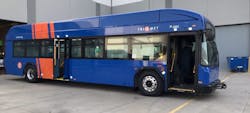TriMet begins tests of additional non-diesel technologies with arrival of new electric buses
TriMet will begin testing on long-range battery-electric buses with the arrival of the first of five new electric buses coming to the fleet.
These buses can travel 150 miles or more on a single charge. But battery-electric buses may not be the only solution to TriMet’s transition to a 100 percent zero-emissions bus fleet. This year, the agency is kicking the tires on even more options.
Fuel cell electric
Earlier this month, the manufacturer of TriMet’s first short-range battery-electric buses, New Flyer, brought a fuel cell-electric bus to Portland. TriMet says fuel cell technology is promising, especially because it extends the range of the bus to as many as 350 miles. Just like battery-electric buses, there are absolutely no carbon emissions. Hydrogen-fueled buses have only two bi-products: water and heat.
Double deck electric
An all-electric double decker bus is on a tour in cities across the west, and it’s making a stop in Portland this week. Double-deckers offer nearly twice the capacity on board, while taking up the same amount of space on the street as a regular bus, and the bus has zero-emissions. The Portland metro area presents some challenges when it comes to double-deckers, like tree branches hanging over streets and the overhead wires for MAX and Portland Streetcar, so TriMet doesn’t currently have plans to add them to the fleet.
Transition to non-diesel: Not one size-fits all
With TriMet’s 84 bus lines serving riders across a 533-square-mile area and serving three counties, the transition to a non-diesel bus fleet may include a diverse mix of technologies that serve conditions specific to certain routes. Some buses may need to be able to travel farther. Some may need to have extra propulsion to climb into higher elevations. Some may make quick trips, on a quick charge, like the original New Flyer battery-electric buses.
Transition to non-diesel by 2040
There’s no doubt that the COVID-19 pandemic presents financial challenges to TriMet’s plans to convert its more than 700 buses to a non-diesel fuel source in less than 20 years. Battery-electric buses still cost about a million dollars each, about twice the cost of a diesel bus. However, TriMet is leveraging federal funds and those generated by the Keep Oregon Moving Act. To date, all of the electric buses have been purchased with the help of grants from Federal Transit Administration’s Low or No Emission Vehicle Program. Additional costs associated with the conversion include charging infrastructure and having adequate space to accommodate it. TriMet will continue pursuing federal and local funding as strategic partnerships to achieve this goal.
A more equitable road ahead
TriMet says it recognizes that low-income communities and communities of color in the Portland metro region are disproportionately affected by carbon emissions. As TriMet rolls out its clean energy plan, the agency is intentionally focusing green technologies in areas that have been impacted by diesel and other pollutants. The Powell Operations Facility, located at Southeast 99th Avenue and Southeast Powell Boulevard, currently under renovation, is being re-engineered to store and power electric buses. The buses that are housed at the Powell facility predominately serve communities of East Portland and Multnomah County.
